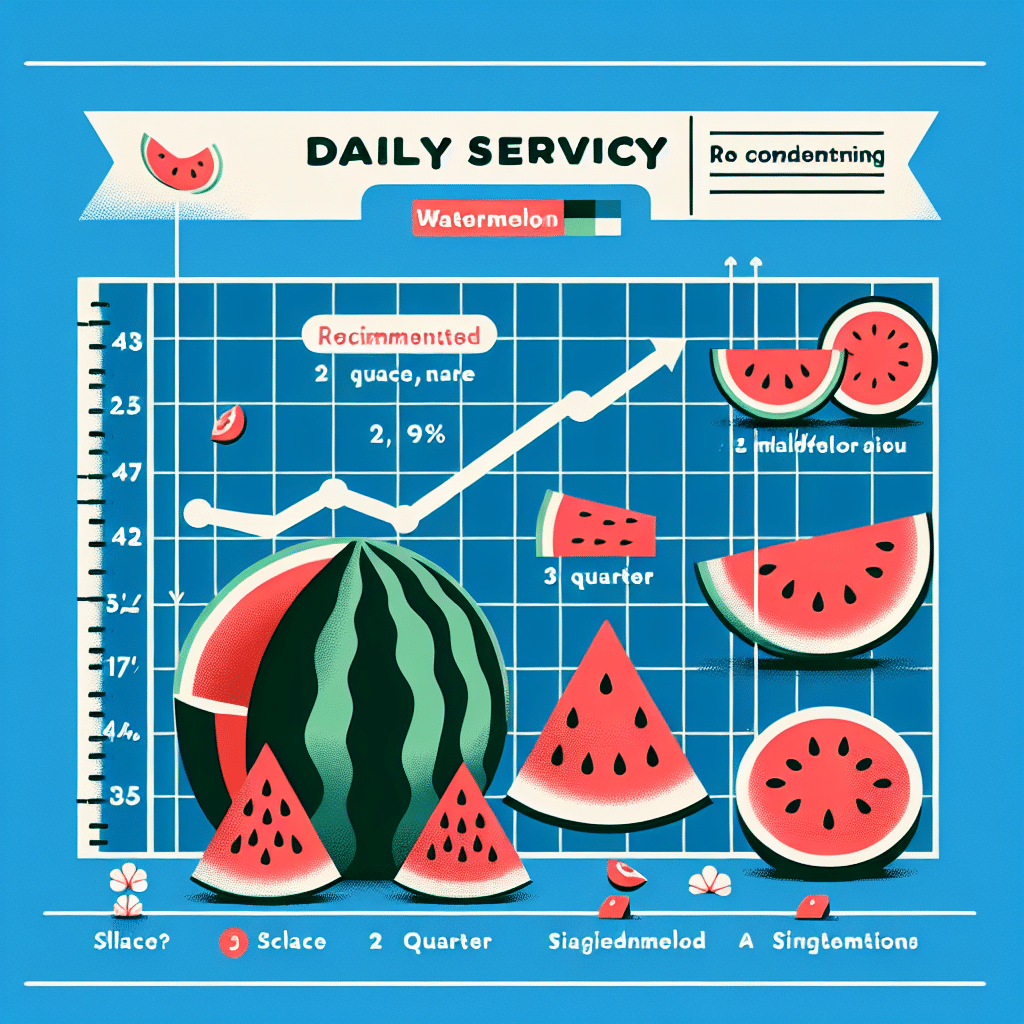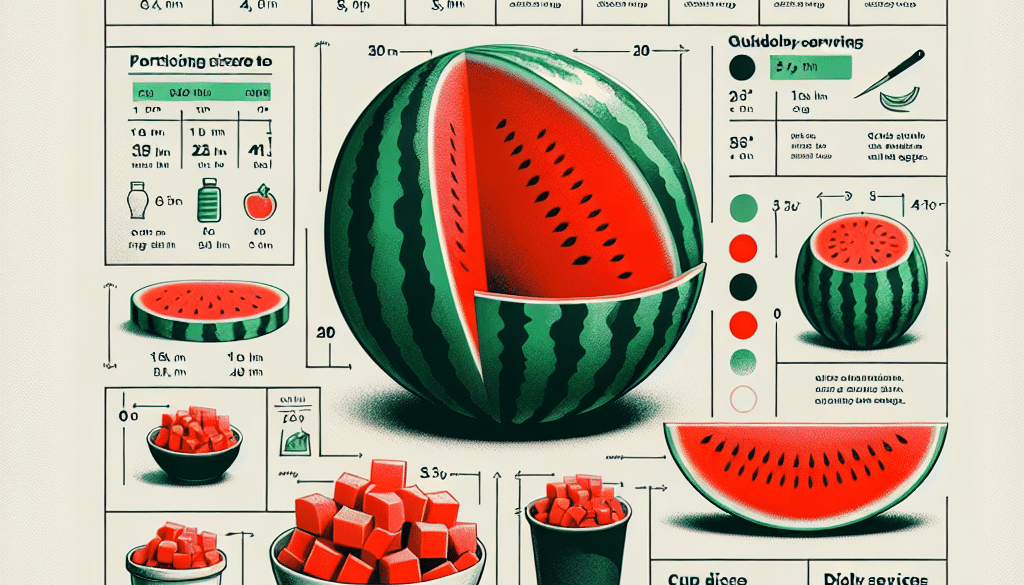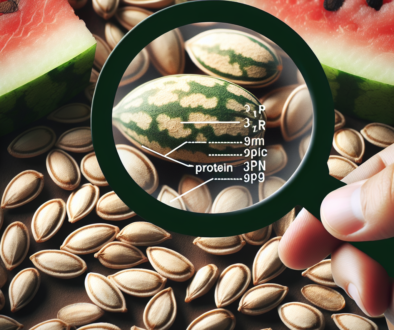Watermelon Servings: How Much Should You Eat?
-
Table of Contents
- Watermelon Servings: Optimal Consumption for Health Benefits
- Nutritional Profile of Watermelon
- Health Benefits of Watermelon
- How Much Watermelon Should You Eat?
- Considerations and Potential Risks
- Incorporating Watermelon into Your Diet
- Conclusion: Balancing Enjoyment and Health
- Enhance Your Diet with ETprotein’s Protein Products
Watermelon Servings: Optimal Consumption for Health Benefits

Watermelon is a refreshing and hydrating fruit that’s not only delicious but also packed with nutrients. It’s a staple at summer picnics and barbecues, but how much watermelon should you eat to reap its benefits without overindulging? This article will explore the ideal watermelon servings, nutritional content, health benefits, and considerations to keep in mind.
Nutritional Profile of Watermelon
Before diving into the recommended servings, let’s look at what watermelon has to offer nutritionally. Watermelon is low in calories and rich in vitamins, minerals, and antioxidants. A standard serving of watermelon is typically considered to be one cup of diced fruit or about 152 grams. This serving size contains:
- Approximately 46 calories
- Less than 1 gram of fat
- 11 grams of carbohydrates
- 0.6 grams of dietary fiber
- 9 grams of sugar
- 1 gram of protein
- 17% of the daily value for Vitamin A
- 21% of the daily value for Vitamin C
- A good amount of potassium, magnesium, and other essential nutrients
Watermelon also contains lycopene, an antioxidant known for its potential to reduce the risk of certain types of cancer and cardiovascular disease.
Health Benefits of Watermelon
Eating watermelon in moderation can contribute to overall health in several ways:
- Hydration: Watermelon is made up of about 92% water, making it an excellent choice for staying hydrated, especially during hot weather.
- Weight Management: Due to its high water content and low calorie count, watermelon can help you feel full without consuming a lot of calories, which is beneficial for weight management.
- Antioxidant Properties: The presence of vitamins A and C, along with lycopene, gives watermelon antioxidant properties that can help protect the body from oxidative stress.
- Heart Health: Lycopene has been linked to heart health by reducing blood pressure and cholesterol levels.
- Anti-inflammatory Effects: Watermelon contains anti-inflammatory compounds that may help reduce inflammation in the body.
How Much Watermelon Should You Eat?
While watermelon is healthy, it’s important to consume it in appropriate amounts. Here are some guidelines to help you determine the right serving size:
- General Recommendations: For most people, eating 1-2 cups of watermelon a day is considered a healthy amount. This provides the nutritional benefits without excessive sugar intake.
- Consider Activity Level: If you’re very active, you might be able to consume more watermelon to help with hydration and energy levels.
- Monitor Blood Sugar Levels: If you have diabetes or other blood sugar concerns, you should be mindful of the natural sugars in watermelon and how they might affect your blood sugar levels.
- Dietary Restrictions: If you’re following a specific diet, such as low-carb or ketogenic, you’ll need to adjust your watermelon intake accordingly.
It’s also worth noting that watermelon can be part of a balanced diet when combined with other fruits, vegetables, lean proteins, whole grains, and healthy fats.
Considerations and Potential Risks
While watermelon is generally safe for most people, there are some considerations to keep in mind:
- Allergies: Some individuals may have an allergy to watermelon. If you experience any allergic reactions, it’s best to avoid the fruit.
- Digestive Issues: Due to its high water and fiber content, eating large amounts of watermelon can lead to digestive issues such as bloating or diarrhea.
- Medication Interactions: Watermelon can interact with certain medications, such as those that alter potassium levels. Always consult with a healthcare provider if you have concerns.
Incorporating Watermelon into Your Diet
There are many creative ways to include watermelon in your diet beyond just eating it on its own. Here are some ideas:
- Salads: Add watermelon to a salad for a refreshing twist.
- Smoothies: Blend watermelon with other fruits and vegetables for a hydrating smoothie.
- Grilled Watermelon: Grilling watermelon can bring out its natural sweetness and provide a unique flavor.
- Frozen Treats: Freeze watermelon cubes or puree for a cool summer treat.
- Watermelon Salsa: Combine diced watermelon with other ingredients like onion, cilantro, and lime juice for a fruity salsa.
Conclusion: Balancing Enjoyment and Health
In conclusion, watermelon is a nutritious and hydrating fruit that can be enjoyed in moderation as part of a balanced diet. Aim for 1-2 cups per day, keeping in mind your activity level, dietary restrictions, and any health conditions. By doing so, you can enjoy the taste and health benefits of watermelon without overindulging.
Enhance Your Diet with ETprotein’s Protein Products
If you’re looking to complement your healthy diet with high-quality protein sources, consider ETprotein’s range of plant-based protein products. Their watermelon seed protein is an excellent addition to smoothies, shakes, and other recipes, providing a boost of vegan protein that’s both organic and allergen-free. Explore ETprotein’s offerings to find the perfect protein supplement for your nutritional needs.
About ETprotein:
ETprotein, a reputable watermelon seed protein Chinese factory manufacturer and supplier, is renowned for producing, stocking, exporting, and delivering the highest quality organic bulk vegan protein and plant proteins. They include Organic rice protein, clear rice protein, pea protein, clear pea protein, watermelon seed protein, pumpkin seed protein, sunflower seed protein, mung bean protein, peanut protein etc. Their offerings, characterized by a neutral taste, non-GMO, allergen-free attributes, cater to a diverse range of industries. They serve nutraceutical, pharmaceutical, cosmeceutical, veterinary, as well as food and beverage finished product distributors, traders, and manufacturers across Europe, USA, Canada, Australia, Thailand, Japan, Korea, Brazil, and Chile, among others.
ETprotein specialization includes exporting and delivering tailor-made protein powder and finished nutritional supplements. Their extensive product range covers sectors like Food and Beverage, Sports Nutrition, Weight Management, Dietary Supplements, Health and Wellness Products, and Infant Formula, ensuring comprehensive solutions to meet all your protein needs.
As a trusted company by leading global food and beverage brands and Fortune 500 companies, ETprotein reinforces China’s reputation in the global arena. For more information or to sample their products, please contact them and email sales(at)ETprotein.com today.














